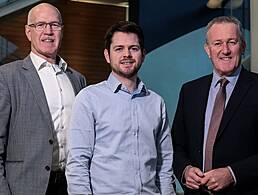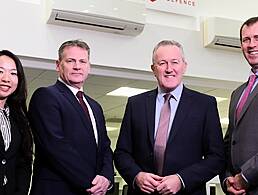How does a Hamilton automation specialist fit into a genomics lab? Genuity Science’s George Penman explains.
Genuity Science, the Dublin-based clinical genomics research company, is currently hiring for a Hamilton automation specialist to develop, deploy and maintain automated systems in its lab using Hamilton robotic equipment such as liquid handlers.
To learn more about this role and the kinds of skills Genuity is looking for, I spoke to one of its senior scientists, George Penman. His responsibilities include managing and implementing new next-generation sequencing processes in the lab.
What type of person should apply for the Hamilton automation specialist role?
This role is a demanding one and requires a lot of independent and pragmatic thinking. We have numerous development projects ongoing. The candidate will be required to build and test, perform user testing and implement feedback, and then implement the process.
What are the most important skills to have to apply for the job?
It is really important to have a background in even basic Venus-based method scripting for Hamiltons. There are many opportunities to learn, grow and develop knowledge in this field. An added bonus is to be familiar with the science behind the method as this will help in making certain decisions, but is not required as this can be learned during the process.
Will the person be working on site?
In the laboratory team we prefer to work from site. Things have changed a lot on how we handle this during the Covid-19 pandemic. We have implemented many measures for working in the laboratory to allow us to continue working from site. For this role, it is particularly important to have access to a robot to test and problem-solve on a real instrument.
How will the successful candidate be onboarded?
We have a fairly thorough onboarding process, which encompasses an overview of all the departments that go together to make up Genuity. For members of the laboratory there is more specific training around the lab processes, with a shadowing programme for all new starts to allow them to see our end-to-end processes in action.
What can the successful candidate expect of the type of work they’ll be doing?
The majority of the work will be involved in using the toolsets developed in the laboratory and to apply them to new applications. This means developing the new methods, testing, and optimisation of liquid classes to make sure that optimal conditions are met.
Most of this will involve from-scratch development of the methods and the majority will be at the desk and working through the methods to test that they work in silico. This will then transition to the teaching and water testing on the Hamilton itself, with the final portion for optimisation and bug checking.
What can they expect of the culture at Genuity?
At Genuity as a whole – and particularly in the laboratory team – we strive to produce the best quality data and results possible. Our goal is that when we do something, we do our best and take careful consideration into scalability. This does not end with the final delivery but extends also to the continued development and improvement of any current processes.
For anyone thinking of applying but unsure if they meet the criteria, what would your advice be?
If the role sounds exciting and you think that you might have some of what it takes, feel free to reach out. We are always happy to address any questions and to review any CVs that are submitted. Our current offerings are on the website and applications can be made directly there.




